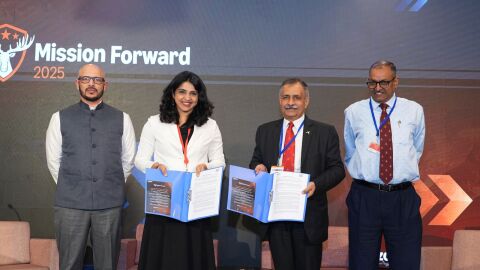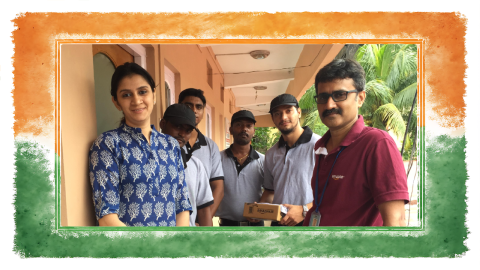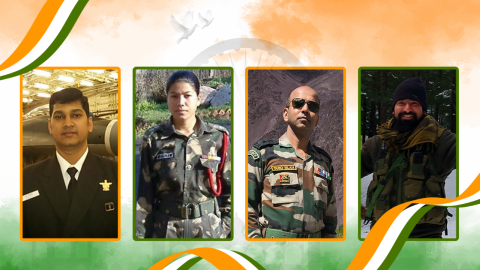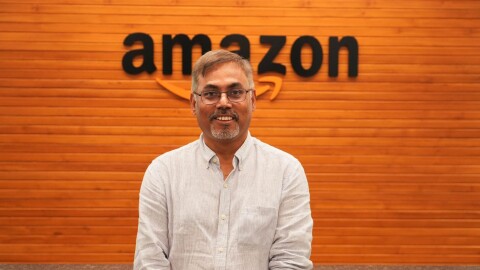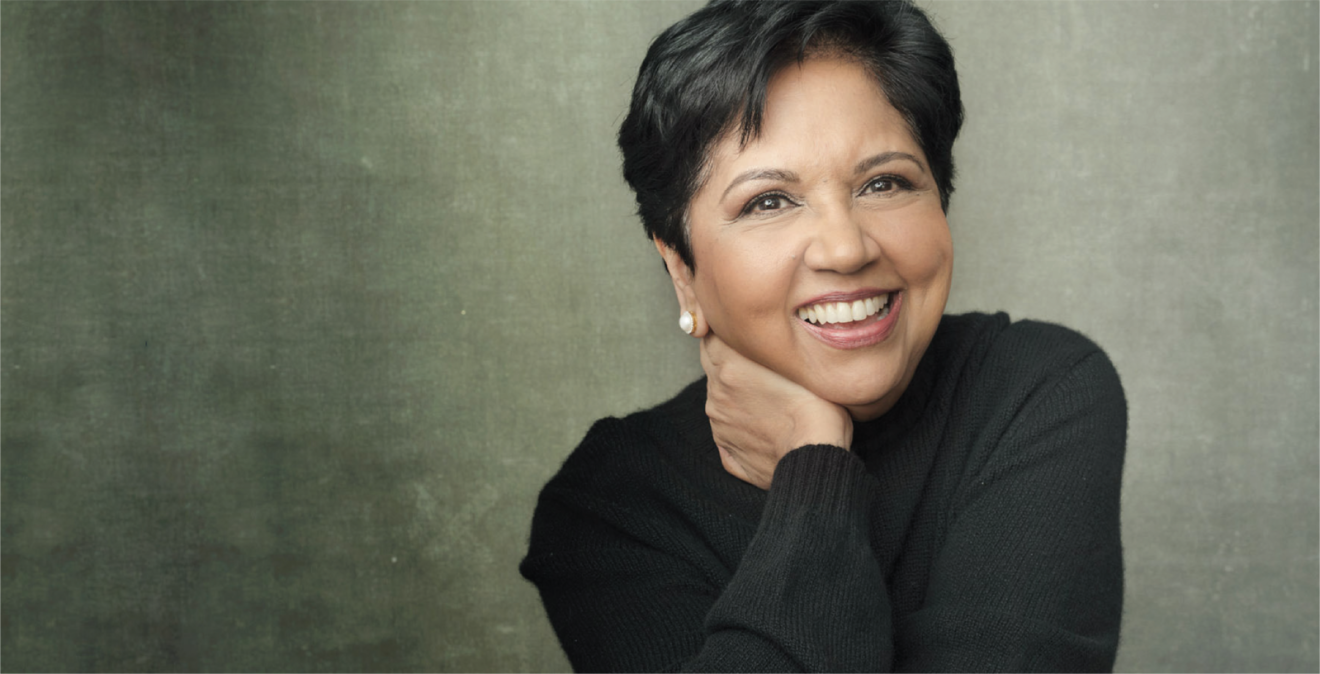
Recently, Amazonians in India had a chance to interact virtually with one of the world's most admired business leaders of our time, Indra Nooyi. Nooyi has several firsts to her credit, including being the first Indian woman immigrant to lead a Fortune 500 company.
A true Indian at heart, she loves watching IPL cricket, Kaun Banega Crorepati, and Bollywood movies as much as she loves the New York Yankees and American TV shows. Among the many accolades and positions she holds, she's a member of the Board at Amazon, where she chairs the Audit Committee. In 2007, the Government of India awarded her the Padma Bhushan, the country's third-highest civilian honour. That same year, she was named an Outstanding American by Choice by the US State Department. In 2019, her portrait was inducted in the Smithsonian National Portrait Gallery.
In a freewheeling chat with Amazonians as part of an in-house Fishbowl event, she spoke about her life, career, learnings, and her first book – a memoir titled My Life in Full: Work, Family, and Our Future, which is also available on Amazon.in.
Here are some edited excerpts from the interaction.
What motivated you to write the memoir?
When I stepped down from my role as the Chairperson and CEO of PepsiCo in 2017, there were a lot of requests for me to write a book and tell my story; and I said the one thing I’m not going to do is write a memoir. I’m going to write a bunch of policy papers on topics such as how do we advance women in management and about COVID-19.
Multiple publishers came to see me and said policy papers are fine, but if you want to make a change, use the arc of your life to tell a story and put the policy within that. So, it’s not a traditional memoir. It’s more life lessons that came out from the arc of my life, leading to policy options and policy discussions. So this is an unusual memoir kind of book.
When sharing about one’s life, it’s often difficult to find those threads that are relevant to a wide audience. How did you sift through your deep enriched personal experience, and decide what you wanted to share with the world?
I learned a lot about writing a book. You never realise how difficult it is to write one. The first thing I did was to hire a very good writer to write with me. We decided to do the book chronologically, and then decide what lessons fit into every part of the chronology. And once you have mapped out the lessons, you start going through your life and decide what aspects of the story need to be told to convey those lessons. And remember, this book is not a tell-all. So all the stories were picked to tell the story in a logical, interesting way. You have to dig deep into the recesses of your memory because what happened 40-50 years ago is very hard to remember, and sometimes painful. Through this 22-month writing process, emotionally, there were highs and lows. But overall, it was an interesting experience.
Tell us a bit about your roots in Chennai and some of the things that have contributed to making you who you are today.
I grew up in good old Madras when the city went to sleep at eight o’clock. I was born in 1955. That was just a mere eight years after India’s independence. India was just trying to figure out educational institutions and the role of women in society. I was born into this supposedly conservative family in the South of India, but it was a family where the men in the family said, ‘I don't care what anybody thinks, but the daughters and granddaughters in this family are going to be allowed to study, do whatever they want to do. Within certain guardrails, but we want them to soar. We want them to dream.’
So I had a grandfather and a father (supported by my mother), who said, ‘Study as much as you can, dream as much as you can, but we're going to get you married at age 18.’ Fortunately, that didn't happen. But they gave us all the resources to study, leave home, and allowed us to work. In those days, this was an enormous risk they took because society wasn't that forgiving about women working or women not getting married at age 18.
So, I think I hit the lottery because I was born into the right family and given the right support. I managed to get into the right colleges and institutions, and therefore do well. So I’m a product of a great family that I was born into, but more importantly, mentors that came along the way in India. I did my part. I had to work my tail off, but I think I was helped along by all of those people.
We would love to hear about your experience of getting selected by the Yale School of Management and any challenges you faced in adapting to a completely different environment.
In the 70s, all my friends from the IITs were going off to the US. They always came back saying that the US is a seat of innovation, invention, culture. When I applied to Yale, I never thought I would get in. Then lo and behold, I got in. I never thought I’d get any aid because clearly, we couldn’t afford that amount of money every year. Surprisingly, Yale came through with a bunch of loans and work programmes and a little bit of scholarship money. Then the biggest surprise was that my parents gave me permission to go, which to me, was just unbelievable.
When I got here, on the one hand, I was enamoured with the orderliness, discipline, etc. But everything was alien to me. There was no food that I liked. I’m vegetarian; I struggled with food. I struggled with the fact that it was so quiet and lonely. The first week, I was desperately lonely. Then, various angels came out and helped me along and helped me get used to the US. People don't even realise it’s such a learning curve. It got easier as time went on.
You ended up at PepsiCo, but GE also wanted to hire you at the same time. If others are faced with a similar situation, what would be your advice for how to make this decision?
Don’t pick the job with the highest pay because that would be the biggest mistake. The discussion on pay should come at the end. Think about the business. Does the business interest you? Is the culture of the company something that you feel good about? Look for cultural markers such as how people interact with you. Are they willing to help you onboard into the company and develop you? Do they have those conversations with you even during the interview process? Look for cultural aspects because, at the end of the day, a paycheck is what you take home. It’s a physical thing. The culture is what you’re going to live with day in and day out.
Were there times in your professional career where you felt like the harmony between work and life or any kind of balance between work and life was impossible? How did you navigate those times?
I had challenges almost every day. When you have two young girls in the family, a husband who is also working and successful, and ageing parents who live with you now and then, you always have this tussle – ‘Am I doing right by them? Am I doing right by my job?’
But I never once wanted to give up my job. Only once in my life, I asked my kids when they were complaining about how mom’s never available. I said, do you want me to quit my job and stay home? And their instant reaction was, ‘No, I don't want you to do that!’
Many women have a fatal flaw, which is the perfection gene. We want to be the perfect mother, the perfect wife, the perfect business person – all of it rolled into one. And because of this perfection gene, we always have this doubt about are we doing the right thing. At some point, we want to put that all aside and say I did the best I could for my family, for myself, and the people around me. You cannot be perfect.
The fact of the matter is, we need women who are talented in the workforce today. And so let’s talk about how to attract all of them to participate in the paid workforce. Let’s help them get rid of the regrets and provide support structures so that they can be with their family and also come to work.
You have two lovely daughters. Have you been a role model mom to them?
Someday, they’ll say I’m wonderful. But it’s not easy being a daughter of mine. A name like Nooyi doesn’t come along often. So anywhere the kids go, the first question they get asked is, ‘Are you related to Indra Nooyi?’ So they are judged based on their relationship with me, which makes it very hard for them. Second is, people expect them to perform at that level, which is also very, very unfair. Most moms are punching bags, but I am a bigger punching bag for my kids. On the other hand, they’re also incredibly proud of me. I have got to understand the conflicts that they go through. I’m proud of everything they do because they both are doing things that I wasn’t doing.
You had said once that women can’t have it all. It’s all a myth. There’s been a lot of questioning around it. Would you like to elaborate?
The problem is that when we talk about family, we say it’s female. Nobody says family is family. It’s all of us – husband, wife, kids. That needs to change. But as long as family is viewed as female, the woman has to do four or five jobs. Because you’re in a workplace that has a lot of unconscious bias, you’re working harder than everybody. So it’s two full-time jobs. And if you become a CEO, that’s four full-time jobs. It’s so taxing. When you go home, you’re the mother, you’re the wife, that’s another couple of jobs thrown in. And if you’re part of an Indian family, you’re also responsible for the in-laws or the parents; you become the primary caregiver. So if you look at these multiple jobs you have to do given that the time is limited, and the pressures on you are so much, it’s impossible to say I’m going to do it all perfectly.
Men have had it easier because they had wives. For women, it’s very hard to be good at all of this because there are so many competing demands on our time.
How important do you think it is to have women on corporate boards and as CEOs? How can organisations get better at having more women in senior positions?
I want to give you some numbers from the US and I’m sure you have the equivalent numbers in India. 70 percent of high school valedictorians are women, and women graduate from colleges at 10 points higher rate than men. Women are getting more professional degrees and getting higher GPAs than men. So women are hungry, they are studying a lot and working hard. Then, when it comes to senior management, jobs board positions, why are we excluding them from the selection pool? If you want the best and the brightest, don’t think about gender. If you did that, you would start to have a more equally represented board.
In today’s world, if you want the best around the table, you’ve got to include the women. You’ve got to include people of all backgrounds because talent is the single biggest competitive advantage of countries. If we really focused on that, we’d be surprised how much talent exists outside of what we traditionally hired from. If you think like an economist and you want to move your company and your country ahead, you’ve got to pull the women up because they are wicked smart.




